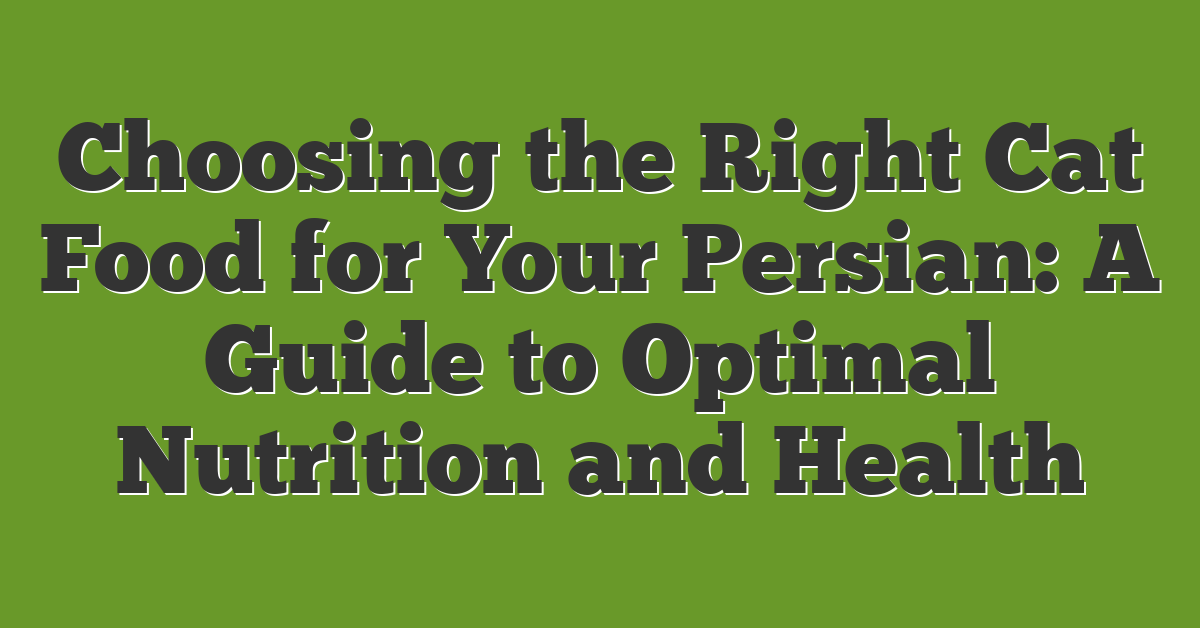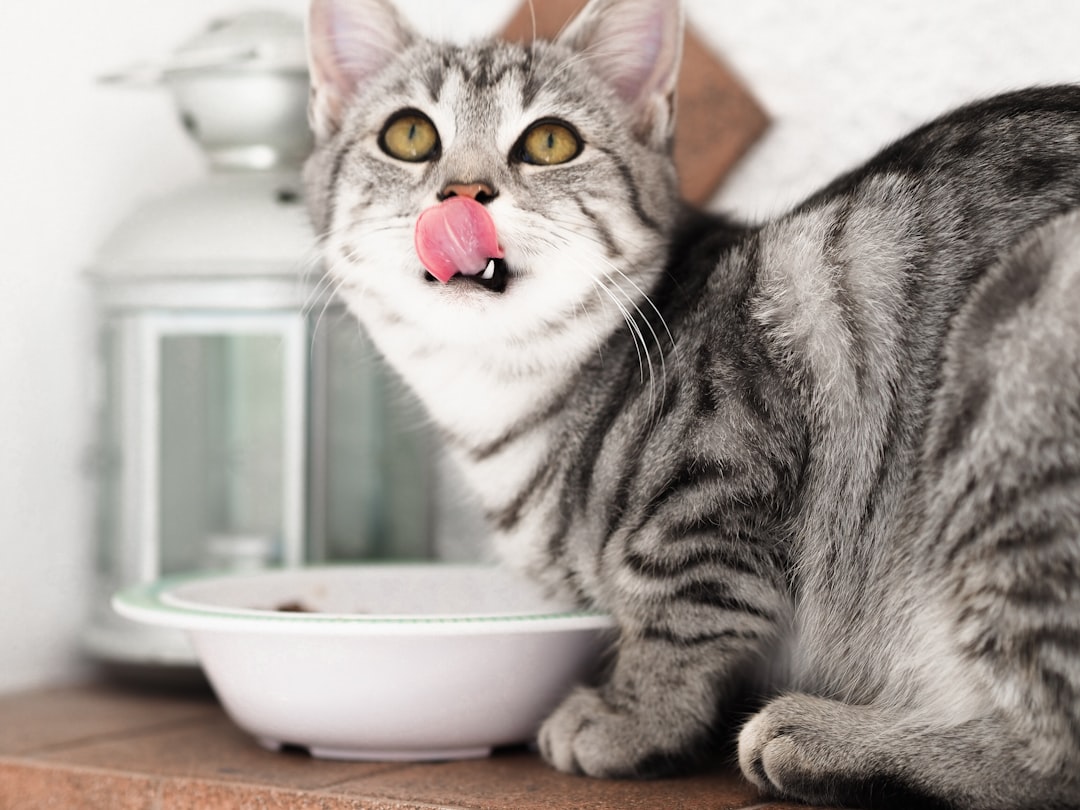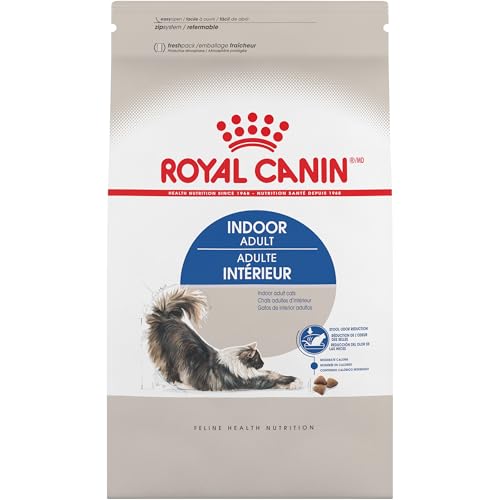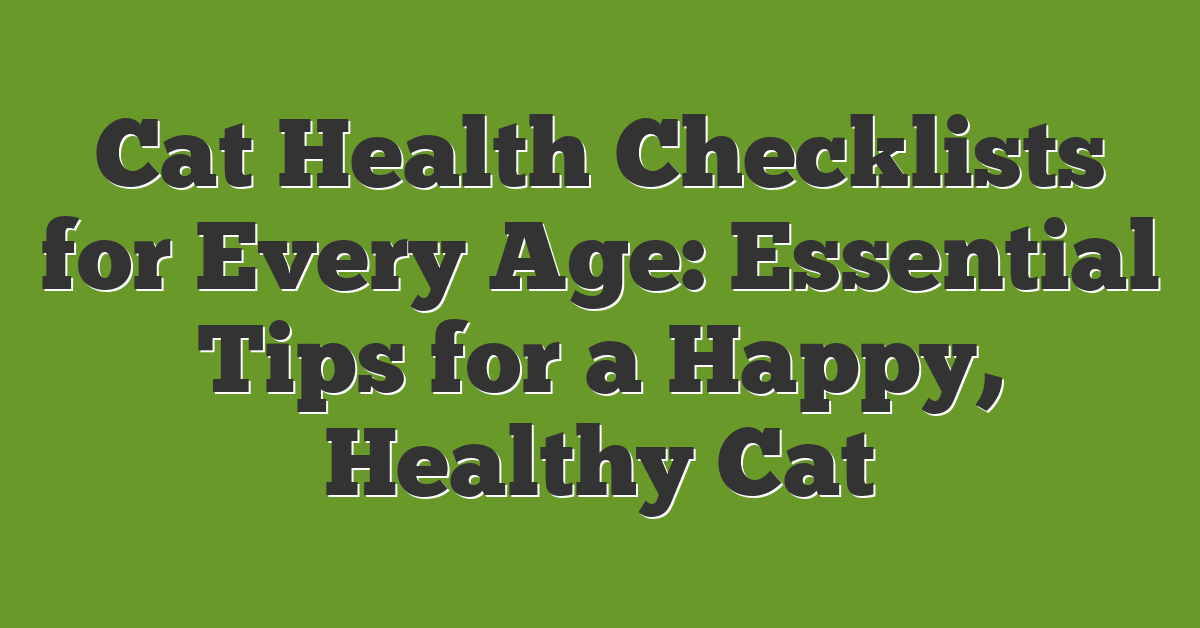If you’re a Persian cat owner, you know there are few things more important than choosing the right cat food. From understanding your cat’s nutritional requirements to selecting the right brand for their needs, providing your feline friend with a balanced diet is critical to their overall health and wellbeing. In this guide, we’ll dive into the best cat food options for Persian cats and provide tips for keeping your kitty happy and healthy. Read on to learn more!

Understand Your Persian Cat’s Nutritional Needs
Persian cats are known for their plush, luxurious coats and expressive faces. But did you know that these beloved felines have specific nutritional needs that must be met in order to maintain optimal health? In this section, we will outline some of the key nutritional requirements for Persian cats.
Persian cats have a relatively low activity level and tend to gain weight easily. Therefore, it is important to provide them with a balanced diet that is low in carbohydrates and high in protein and fat. Research shows that cats are carnivores and require animal-based protein, so look for cat foods that list meat as the first ingredient.
Some Persian cats may have food sensitivities or stomach issues, so it is important to choose a cat food that is easy to digest and contains natural, hypoallergenic ingredients. Additionally, Persian cats can be prone to urinary tract issues, so a cat food that supports urinary tract health is recommended.
Senior Persian cats and kittens also have unique nutritional requirements. Senior cats may require a lower calorie diet with added joint support, while kittens need a higher calorie diet with added nutrients to support growth and development.
In summary, Persian cats require a balanced diet that is high in animal-based protein and healthy fats, and low in carbohydrates. Look for cat foods with natural, hypoallergenic ingredients that support urinary tract health. Consider the unique nutritional needs of senior cats and kittens when selecting a cat food. Remember that proper nutrition is essential for maintaining your Persian cat’s health and well-being.
Types of Cat Food to Consider:
- Wet cat food
- Dry cat food
What to Look For When Choosing a Cat Food for Your Persian:
- Quality ingredients
- Kibble size
- Balanced diet
- Protein content
- Low-carb diets
- High-fat diets
- Grain-free diets
- Meat-based diets
- Limited ingredient diets
- Natural ingredients
- Hypoallergenic diets
- Sensitive stomachs
- Weight management
- Urinary tract health
- Hairball control
- Digestive health
- Senior cats
- Kitten food
- Vet recommended
- Popular brands
- Customer reviews
- Affordable options
- Premium options
- Organic cat food
- Homemade cat food
Types of Cat Food to Consider
There are several types of cat food to consider when choosing the best cat food for your Persian feline companion. Below are some of the most common types of cat food to consider:
- Wet Cat Food
Wet cat food, also known as canned cat food, contains a higher moisture content than dry cat food. This can be beneficial for cats who may not drink enough water on their own. Wet cat food is also a good option for cats with sensitive digestive systems or dental issues, as it is easy to chew and digest. Look for wet cat food that contains high-quality protein sources and limited carbohydrates.
- Dry Cat Food
Dry cat food, also known as kibble, is a popular option because of its convenience and affordability. However, it is important to choose a high-quality dry cat food that contains a balanced diet of protein, carbohydrates, and fats. Additionally, when it comes to Persian cats, it’s important to choose a kibble size that is easy for them to chew and swallow. Look for kibble specifically designed for Persian cats.
- Limited Ingredient Diets
Some cats may have allergies or sensitivities to certain ingredients. Limited ingredient diets are made with a limited number of ingredients to reduce the chances of triggering an allergic reaction. Look for a limited ingredient diet that contains high-quality protein and natural ingredients.
- Grain-Free Diets
Grain-free diets have become increasingly popular in recent years. They are made without any grains such as corn, wheat, or rice. However, it’s important to note that grains are not necessarily unhealthy for cats and can provide important nutritional benefits. If you do choose a grain-free diet, make sure it still contains a balanced diet of protein, carbohydrates, and fats.
- Natural and Organic Cat Food
Natural and organic cat food is made with high-quality, natural ingredients and is free from artificial preservatives, flavors, and colors. While this type of cat food may be more expensive, it can provide important health benefits for your Persian cat.
When choosing the best cat food for your Persian cat, it’s important to consider their individual nutritional requirements and any specific health concerns they may have. Consult with your veterinarian for specific recommendations and always check the ingredients list and nutritional information before making a purchase.
What to Look For When Choosing a Cat Food for Your Persian
When it comes to choosing the best cat food for your Persian, there are a few key things to keep in mind. Here are some factors to consider:
Nutritional Requirements
Persian cats have unique nutritional requirements that should be met in their diet. They require a balanced diet with a protein content of 25-35%. Low-carb diets with high-fat content work best for these cats, as they help maintain their energy levels and weight. Grain-free diets that are rich in meat-based proteins are also ideal for Persians, as they help prevent health issues like obesity, diabetes, and digestive problems.Quality Ingredients
Always look for cat foods that contain quality ingredients. Avoid cat foods that contain fillers and artificial preservatives, as they can harm your cat’s health. Instead, look for cat foods that list natural ingredients like chicken, fish, and vegetables, and avoid those that contain by-products, corn, and wheat.Wet or Dry Cat Food
When choosing between wet and dry cat food, consider your cat’s preferences and health needs. Wet cat food is often recommended for cats with sensitive stomachs, as it is easier to digest and provides moisture that helps prevent urinary tract infections. Dry cat food is more convenient and is often recommended for cats that need to lose weight or maintain their dental health.Limited Ingredient Diets
If your Persian has a sensitive stomach or allergies, consider a limited ingredient diet. These diets are made with a limited number of ingredients and are free from common allergens like grains, dairy, and poultry. They are also ideal for cats with digestive issues, as they eliminate potential triggers that can cause gastrointestinal problems.Brand and Customer Reviews
When selecting a cat food brand, do your research and read customer reviews. Look for brands with a good reputation for quality and reliability, and read feedback from other Persian cat owners to get a better understanding of how the food has worked for their cats.
Some popular brands of cat food for Persian cats include Royal Canin, Hill’s Science, and Orijen. These brands offer a variety of options that cater to the unique nutritional needs of your Persian cat.
By keeping these factors in mind, you can choose the best cat food for your Persian and provide them with the nutrition they need for optimal health.
Popular Brands of Cat Food for Persian Cats
When it comes to choosing the best cat food for your Persian cat, there are a multitude of brands and varieties on the market. However, not all cat foods are created equal and it is important to research the different options available and choose a brand that meets your Persian’s nutritional needs. Here are some popular brands of cat food that are recommended for Persian cats:
Royal Canin Persian Cat Food – This brand offers a variety of options specifically tailored to the unique needs of Persian cats, including a kibble size designed for their flat faces and a nutrient profile that helps maintain a healthy coat. Their formulas are also enriched with antioxidants for immune system support.
Hill’s Science Diet Adult Indoor Cat Food – This brand offers formulas designed for indoor cats with a focus on weight management and digestive health. It is made with high-quality ingredients and contains a balanced proportion of protein, fat, and carbohydrates to maintain good health.
Purina Pro Plan Focus Indoor Care – This brand is designed for indoor cats and contains live probiotics to promote digestive health. Purina Pro Plan uses high-quality protein sources and limited ingredients to reduce the risk of food sensitivities.
Blue Buffalo Indoor Health Adult Cat Food – This brand offers a grain-free formula with a blend of antioxidants, vitamins, and minerals to support immune system health. It is made with real chicken to promote a healthy weight and muscle maintenance.
Orijen Cat & Kitten Dry Food – This brand takes a holistic approach, using whole meat ingredients, fruits, and vegetables to provide a well-rounded and balanced diet. It is high in protein and low in carbohydrates to support lean muscle maintenance and weight management.
It is important to note that each cat is unique and may have different nutritional needs, so it is important to consult with your veterinarian before choosing a specific brand of cat food. Additionally, many cat owners may choose to rotate between different brands and formulations to provide variety and ensure their cat is receiving a balanced diet.
Homemade and Organic Cat Food Options for Your Persian
Persian cats can be fussy eaters and may not always respond well to commercial cat food brands. This is where homemade and organic cat food options can come in handy. When it comes to feeding your Persian cat with homemade or organic cat food, there are a few things you should consider.
- Nutritional balance
Just like with commercial cat food, homemade and organic cat food should be nutritionally balanced. This means that it should include all the necessary elements for your cat’s health, such as protein, carbs, fats, and vitamins. When making homemade cat food, it’s important to use quality ingredients and avoid fillers like corn and soy.
- Low-carb and high-fat diets
Persian cats are more prone to obesity and diabetes than other cat breeds, so it’s important to keep their diet low on carbs and high in healthy fats. You can include ingredients like chicken, turkey, beef, salmon, and sardines as well as healthy fat sources like coconut oil, fish oil, and olive oil.
- Limited ingredient and hypoallergenic diets
If your Persian cat has food allergies or a sensitive stomach, you may want to consider a limited ingredient or hypoallergenic diet. Ingredients like wheat, soy, dairy, and artificial preservatives can cause allergies and digestive problems in some cats. You can use simple ingredients like rice, chicken, and sweet potatoes for a limited ingredient diet or opt for hypoallergenic ingredients like kangaroo, rabbit, or venison.
- Urinary tract health
Persian cats are also prone to urinary tract problems, so you’ll want to provide them with the right nutrients to support their urinary health. You can include ingredients like cranberries, pumpkin, and probiotics to promote a healthy urinary tract.
- Senior cats and kittens
Senior cats and kittens have specific nutritional requirements that you’ll want to consider when making homemade or organic cat food. Kittens need more protein and calories for growth, while senior cats need more fiber and joint support. You can adjust your homemade cat food recipes accordingly to ensure that your Persian cat gets the right nutrients at different stages of their life.
When it comes to homemade and organic cat food, it’s important to consult with your veterinarian to ensure that your recipes provide the right nutrients for your Persian cat. You can also research popular recipes online and read customer reviews to get ideas. Some popular organic cat food brands include Castor & Pollux, PetGuard, and Wellness, among others. With the right ingredients and guidance, homemade and organic cat food can be a great option for keeping your Persian cat healthy and happy.
Tips for Feeding Your Persian Cat for Optimal Health
Feeding your Persian cat is a critical aspect of its overall health and wellbeing. While Persian cats may be notoriously fussy when it comes to food, it is essential to ensure that they receive a balanced and nutritious diet that meets all their requirements. Here are some tips to keep in mind when feeding your Persian cat for optimal health:
Understand their Nutritional Needs: Persian cats require a well-balanced diet that includes specific nutrients, including protein, fat, vitamins, and minerals. Since they have a low activity level, they do not need as many calories as other cat breeds. As obligate carnivores, they also require a higher protein diet than most other animals.
Choose the Right Type of Cat Food: When it comes to cat food, you have several options to choose from, including wet cat food, dry cat food, and semi-moist cat food. Wet cat food is an excellent option for Persian cats as it contains a high amount of water that helps them stay hydrated. Dry cat food is convenient, but it should be supplemented with wet food to ensure that they meet their water requirements.
Look for Quality Ingredients: When selecting cat food for your Persian, look for quality ingredients that provide your cat with optimal nutrition. Avoid cat food containing fillers, artificial colors, and flavorings. Choose a cat food brand that uses natural ingredients to provide your cat with the best possible diet.
Consider Your Cat’s Health Conditions: Persian cats may have certain health conditions that require special diets. For example, some cats may have allergies, sensitive stomachs, or be overweight. Be sure to choose a cat food that meets their unique dietary requirements. Additionally, senior Persian cats may require specialized food to help manage their age-related health problems.
Control Portion Sizes: Persian cats tend to overeat and gain weight easily, leading to obesity and related health issues. Therefore, it is essential to control their portion sizes and feed them a balanced diet. Work with your veterinarian to determine the appropriate portion sizes based on your cat’s age, level of activity, and health status.
In conclusion, feeding your Persian cat a healthy and appropriate diet is vital for their overall wellbeing. By understanding their nutritional requirements, choosing the right type of cat food, and controlling their portion sizes, you can provide your cat with the best possible diet to keep them healthy and happy for years to come.


















